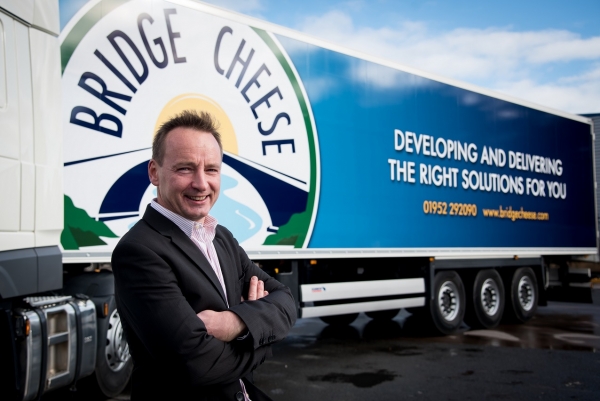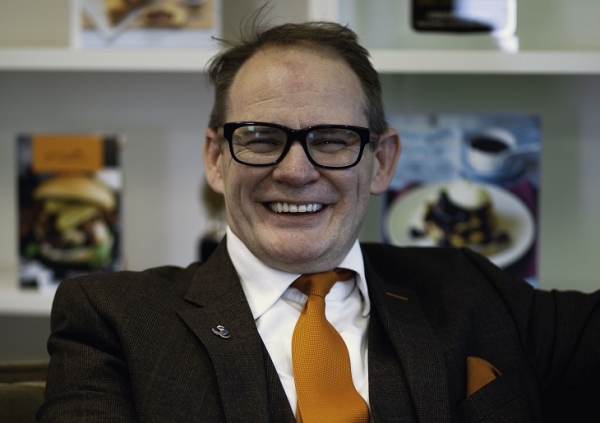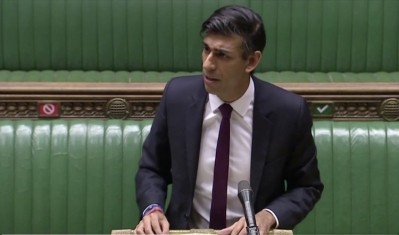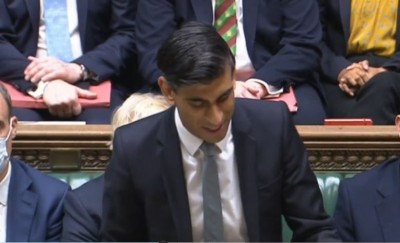Chancellor Rishi Sunak's spring Budget 2021 reaction

The reaction was favourable on the whole.
Michael Harte, managing director of Telford-based dairy processor Bridge Cheese, said more detail was needed on what kinds of research & development (R&D) would be eligible for the new 130% tax relief: “I’ll be interested to understand the detail around the super deduction tax relief for manufacturers who invest. Few will be planning major cash splurges on big investments this year while the wider economy recovers over the pandemic and issues remain with the existing trade agreement with the EU."
“However, we are a sector business which is looking to grow this year and are planning to expand our facility in Telford. So we will be keen to see if that investment will have additional benefits for Bridge Cheese with these new announcements."
R&D support
National Farmers Union president Minette Batters said she was disappointed the R&D support would not support farmers in every area: “We are disappointed that the ‘super-deduction’ on machinery investment is only applicable to limited companies and not available to all businesses, especially when significant investment in new farm technology is required."
Harte was positive about the announcements concerning VAT and the furlough scheme: "We were very pleased to hear that supporting businesses and jobs was top of the shop in the budget, and that key initiatives introduced last year to help companies through the pandemic will be here to stay for a few more months – like the extension to the furlough scheme, and the VAT cut.

“We also welcomed the news that corporation tax changes will be delayed and new increases to tax on profits will be tapered. As a medium-sized business which is scaling rapidly, it’s important that we are allowed to develop and expand our operations without being punished with a big tax bill for being agile and adapting to the hostile trading conditions caused by COVID and the UK’s EU exit.”
Reduced VAT rate
Batters echoed many of Harte's comments. “Farm businesses, and their diversified enterprises, will welcome the Chancellor’s decision to extend the reduced rate of VAT for retail, hospitality and leisure, extend business rates relief, offer further grants for the self-employed, introduce a new recovery loan scheme and make restart grants available for tourism and hospitality businesses. These are all measures that will support rural businesses to recover from the impact of COVID-19.
“The announcement of the UK Infrastructure Bank to finance green investment could be a crucial tool in stimulating investment and driving green economic growth. The launch of the Levelling Up Fund could also be positive for rural areas in narrowing the growing divide between rural and urban. We look forward to receiving more detail on how this may work in practice.
“With all of these announcements, it’s incredibly important that the needs of rural businesses are accommodated and that they are able to access appropriate funding. Our new ‘Levelling up rural Britain’ report highlights how investment in British farming and rural Britain can bring huge benefits to sustainable food production, but also the entire nation; delivering jobs, green growth, exports and wellbeing for the entire nation. It’s vital it is embraced by the Treasury and the government.”
Paul Baker, founder of branded bakery business St Pierre Groupe, agreed with Harte: “The extension of VAT reduction is a lifeline. Cut Tourism VAT Campaign warned that VAT rate reverting to 20% in April would mean the loss of 310,000 more jobs in hospitality and tourism, so it’s a relief to many to hear VAT will remain at 5%. The gradual return to 20% over 12 months will also take the pressure off.
Extension to business rates holiday
“Hospitality operators have been well supported with an extension to the holiday on business rates. Last year, that holiday negated the economic impact of the virus by £10.13bn, money that many operators would struggle to find – especially whilst they’re unable to open up again until later in the year. My only criticism of this, is the gradual increase from June. Despite the roadmap, businesses have a lot of lost time to make up for and whilst it displays confidence in a return to ‘normal’ from June, many businesses will still struggle to manage even the proposed third of the business rate after spending more than a year unable to operate.

“Admittedly, it’s encouraging to see that no major increases on corporation tax will be introduced until 2023. The dichotomy of increasing corporation tax to protect the voting public, balanced against the need to engage big businesses who will be relied upon to save and create millions of jobs over the coming 12 months, is no doubt a difficult juggling act."
Food and Drink Federation chief executive Ian Wright said: “The Chancellor’s announcement struck the right balance between supporting recovery and acknowledging the difficult choices that have to be made to restore the country’s finances. Food and drink businesses supplying the hospitality and foodservice sectors will welcome the extension of the furlough scheme. However, we have concerns that support tapers too soon and should be kept under review.
Apprenticeships
“As the UK’s largest manufacturing sector, we welcome the news that the Bank of England and the Chancellor are doubling incentive payments for businesses hiring apprenticeships. However, increased flexibility of the Apprenticeship levy would enable the system to work for the wider food and drink supply chain, particularly SMEs [small and medium-sized enterprises], and must be considered in relation to any new incentives.
“The Chancellor rightly expressed his firm intention not to increase the cost of living and has recognised the importance of encouraging investment as the key driver of recovery. He should therefore review proposed regulatory changes that will increase food prices.”
Clive Black, director and head of research at Shore Capital, highlighted that, according to the plans set out by Sunak, corporation tax would rise from 19% to 25% in April 2023, adding: "Interestingly, no mention of business rate reform and digital taxation; no doubt these will be down the line possibly in the autumn. Lastly, within the aforementioned constraints, all eyes will now be on mutations, vaccinations and unlocking, in the hope of more wiggle room to support the economy in Budget 2022.
Autumn 'a key time'
"Remedial pandemic support tails off in the late summer, which, assuming Coronavirus mutations do not cause more chaos, means that the autumn will be a key time for consumer markets with respect to the follow-through. We do not expect households to blow their £125bn+ cash balances in one go whilst travel restrictions are likely to keep many Britons in the UK this year, even with much greater mobility, the latter which we should note will help the travel sector.

"Despite much pre-Budget noise there was no mention in the speech, unless it is buried in the Red Book, on the subject of necessary reform of Britain’s chronically failing business rate system and corresponding digital taxes, including the recently muted delivery tax. No doubt such subjects will be returned too, but Amazon can open its new Fresh store in Ealing still firmly in the knowledge that in the UK at least, it does not need to pay its way, yet."
Commenting on the response of the supermarkets to the Budget, Black added in a subsequent trading note: "We noted the statements from the major supermarket groups that, as expected, they will forego rate relief.
Emma McClarkin, chief executive of the British Beer & Pub Association, said: “We welcome the Chancellor’s announcement of continued support for the devastated pub sector in the form of additional grants, as well as extensions to the job retention scheme, 5% hospitality VAT rate and business rates holiday.
Extension of job retention scheme
“The extension of the job retention scheme until September will help save thousands of pub jobs. Worth £700m to our pubs and brewers, it gives the sector time to reopen and rebuild trade before bringing all staff back, which would otherwise be too costly and unviable whilst still facing trading restrictions until end of June. It is imperative that the Government allows pubs to operate without restrictions as planned from 21st June. This will give them the best chance to get back on their feet and serve their communities."
Extending the 5% VAT hospitality rate until September and at 12.5% thereafter would be worth £485m to pubs, said McClarkin. "However, wet led pubs will be especially disappointed again that the reduction will not apply to all beverages so they too can benefit from this." She pressed for this to be applied until at least the end of 2021.
On the 100% cut on business rates until June and up to 66% cut for the following nine months, she said: "This is good news, but the proposed cap will mean many pub businesses will not benefit fully from this. We await to see more detail."
She welcomed the beer duty freeze, but continued to call for a cut in duty.
Commenting on the announcement of the first UK freeports, Marco Forgione, director general, of the Institute for Export & International Trade, said: "Congratulations to the first eight Freeport winners unveiled in Budget 2021 by the Chancellor. They are trailblazers with the chance to regenerate their regions, redefine the role of freeports and create a new international trading network in a strong United Kingdom."
Summing up in his Budget speech to MPs in the House of Commons, Sunak said: "An important moment is upon us. A moment of challenge and of change. Of difficulties, yes, but of possibilities too. This is a Budget that meets that moment. And I commend it to the House."
Main points of the Budget
- More than £1.7bn to support COVID-19 vaccine roll-out, testing and trials
- An extension of the Coronavirus Job Support Scheme to September 2021 across the UK.
- An extension of the UK-wide Self Employment Income Support scheme to September 2021, with 600,000 more people who filed a tax return in 2019-20 now able to claim for the first time.
- A new UK-wide Recovery Loan Scheme to make available loans between £25,001 and £10m, and asset and invoice finance between £1,000 and £10m, to help businesses of all sizes through the next stage of recovery.
- Extension to the VAT cut to 5% for hospitality, accommodation and attractions across the UK until the end of September, followed by a 12.5% rate for a further six months until 31 March 2022.
- 750,000 eligible businesses in the retail, hospitality and leisure sectors in England will benefit from business rates relief.
- Extension of the apprenticeship hiring incentive in England to September 2021 and an increase of payment to £3,000.
- £7m for a new 'flexi-job' apprenticeship programme in England, that will enable apprentices to work with a number of employers in one sector.
- Additional £126m for 40,000 more traineeships in England, funding high quality work placements and training for 16-24 year-olds in 2021/22 academic year.
- Small and medium-sized employers in the UK will continue to be able to reclaim up to two weeks of eligible Statutory Sick Pay costs per employee from the Government.
- To further support the cashflow of businesses, the government is extending the loss carry back rules worth up to £760,000 per company.
- To balance the need to raise revenue with the objective of having an internationally competitive tax system, the rate of Corporation Tax will increase to 25%, which will remain the lowest rate in the G7. In order to support the recovery, the increase will not take effect until 2023. Businesses with profits of £50,000 or less, around 70% of actively trading companies, will continue to be taxed at 19% and a taper above £50,000 will be introduced so that only businesses with profits greater than £250,000 will be taxed at the full 25% rate.
- Fuel duty will be frozen for the 11th consecutive year.
- Alcohol duties will be frozen across the board for the second year running saving drinkers £1.7bn.
- Capping the amount of SME payable R&D tax credit that a business can receive in any one year at £20,000 (plus three times the company’s total Pay-As-You-Earn and National Insurance Contributions liability).
- Beginning April 2021, the new super-deduction will cut companies’ tax bill by 25p for every pound they invest in new equipment. This is worth around £25bn to UK companies over the two-year period the super-deduction will be in full effect.
- Eight new English Freeports will be based in East Midlands Airport, Felixstowe & Harwich, Humber, Liverpool City Region, Plymouth, Solent, Thames and Teesside.
- The £375m UK-wide ‘Future Fund: Breakthrough’ will invest in highly innovative companies such as those working in life sciences, quantum computing, or clean tech, that are aiming to raise at least £20m of funding.
- Reforms to the immigration system will help ambitious UK businesses attract the brightest and best international talent.
- A new Help to Grow scheme to offer up to 130,000 companies across the UK a digital and management boost.
- A review of Research & Development tax reliefs to make sure the UK remains a competitive location for cutting-edge research.
















